How The Right Gut Bacteria Benefits Your Health and Longevity

The evidence is incontrovertible — your gut bacteria benefits your health and longevity; if, that is, they’re the right kind. Harmful bacteria influence most chronic diseases and can decrease your healthspan. Find out what to do.
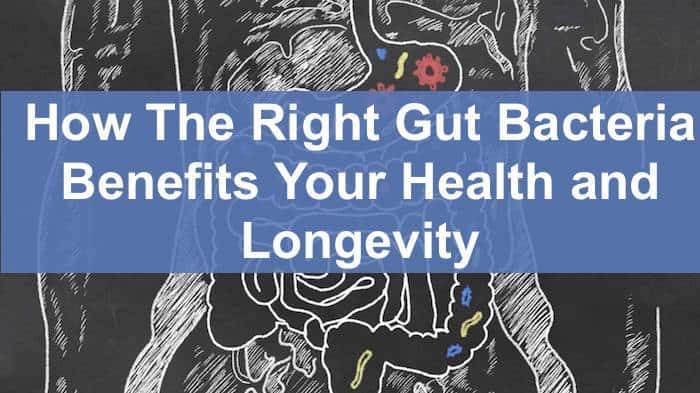
Updated on July 27, 2022
Humans are living longer, but not healthier.
Right now there are about 962 million people aged 60 and above across the globe, increasing by 3% annually. By 2050, this number is projected to more than double, and the number of people aged 80 and above is expected to triple. (1)
No one really dies of old age, but by one of a number of chronic diseases that become increasingly deadly as we age. And indeed, chronic disease is spreading like wildfire:
- Three of four older adults living in developed countries suffer from chronic disease and is predicted to rise dramatically. (2)
- According to the World Health Organization, chronic disease prevalence is expected to rise by 57% by the year 2020. (3)
- In 2014, 60% of Americans had at least one chronic condition, and 42% had multiple chronic conditions. (4)
Could be that you’re nestled in those statistics, or are heading in that direction. So, what to do? Well, one important thing you can do is to play nicely with the +/- 100 trillion microbes in and on your body, mostly in your gut.
Here’s what’s covered in this post:
- Are your gut bacteria a root cause of chronic disease?
- Are yours beneficial or harmful? Get tested!
- How to get the right gut bacteria benefits.
- Your takeaway.
Let’s dig in…
Is Gut Bacteria A Root Cause of Chronic Disease?
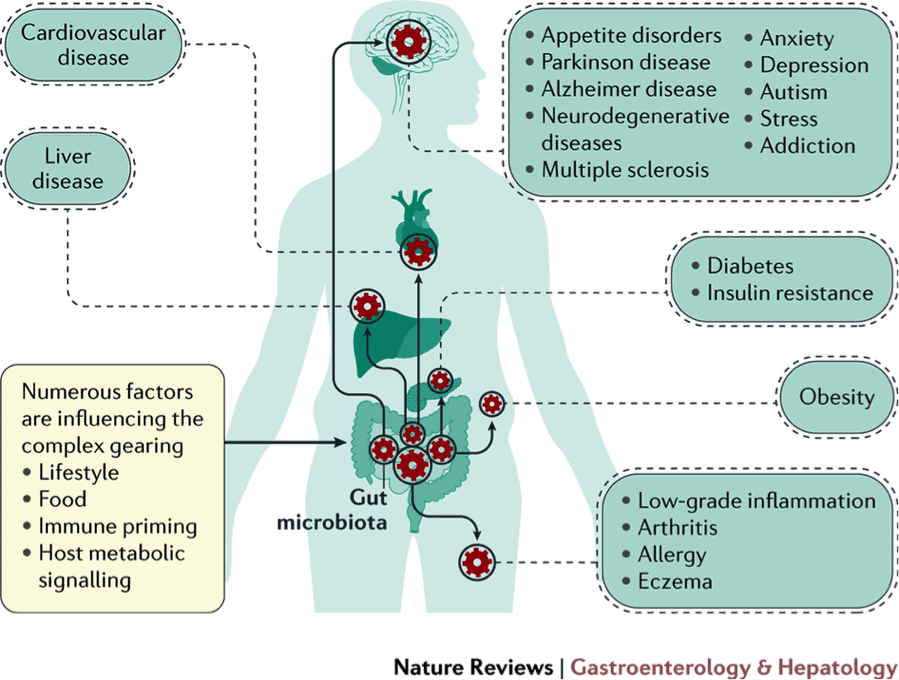
Quick answer: gut bacteria may only be a root cause of some chronic diseases, but can always be an amplifier of most chronic diseases if the bacteria are dominated by harmful strains. There are many reasons this is true, but none more dominant that the role that gut microbiota (bacteria) have on your immune system and inflammation.
As detailed in the Role of the Microbiota in Immunity and inflammation, authored by Drs. Yasmine Belkaid and Timothy Hand, the microbiota plays a fundamental role on the induction, training and function of your immune system. When functioning optimally, the symbiotic alliance between the immune system and microbiota protects you against pathogens; however, the overuse of antibiotics and diets dominated by sugar, alcohol and processed foods (preservatives, emulsifiers and food coloring) can become weaken your immune system.
And that’s precisely what’s been happening.
Autoimmune and inflammatory diseases associated with dysregulated immune responses have risen dramatically over the past few decades, say Yasmine and Belkaid, and with it, the focus on microbiota as an intrinsic regulator of all immune responses.
Because of the microbes that inhabit it, your gut is now considered to govern about 70% of your immunity. (5)
Let’s take a look at how this plays out with various chronic diseases, each of which gut bacteria can improve– if they’re the right kind!
The Right Gut Bacteria Benefits Alzheimer’s 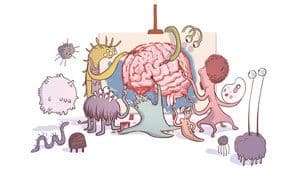
Next to cancer, Alzheimer’s might be our most feared disease. Although cancer is a wretched disease that can slowly kill you as you wither away, you still remain largely who you are. Not so with Alzheimer’s and various forms of dementia, as with these you lose your mind, and thus who you are.
Alzheimer’s is horrific and it’s not going away.
By the year 2060, the Alzheimer’s disease burden in the United States will have doubled, say the Centers for Disease Control and Prevention (CDC). By then, they predict that almost 14 million people will have Alzheimer’s and other forms of dementia.
That’s why researchers like Dr. Marina Ezcurra are studying the disease in the fastest way possible — in worms. Her research broadly focuses on how aging and its related diseases occur in teeny tiny worms called C-elegans (Caenorhabditis elegans), and more narrowly on gastrointestinal aging and the role of the microbiome in this process. (The microbiome is the ecological community of microbes.)
Yes, as with fruit flies, rodents and the like, it’s strange to suggest that studying the lowly worm could show something about us, yet C. elegans, having a lifespan of only 2–3 weeks, develops several pathologies as it ages, just as we do.
For that reason, researchers use C. elegans as a model for several human diseases and age-related processes, such as resistance to stress, growth, fecundity, lifespan… and Alzheimer’s.
But you’ve never met a worm with Alzheimer’s, have you?
Of course you wouldn’t know unless you could check their amyloid-beta. These are the peptides of 36 to 43 amino acids that are crucially involved in Alzheimer’s disease as the main part of the amyloid plaques found in the brains of Alzheimer patients of the human variety. (6)
What Dr. Ezcurra and her team found was that feeding the worms specific bacterial strains protected them from tumor growth and accumulation of amyloid-beta. (7)
Although the wonderful bacteria that achieved this Alzheimer’s protection wasn’t revealed, and hasn’t been tested in humans, the study did show the beneficial effects that some gut bacteria could have on protecting us from something as devastating as Alzheimer’s.
So, trash your soda and keep on reading.
The Right Gut Bacteria Benefits Mental Health 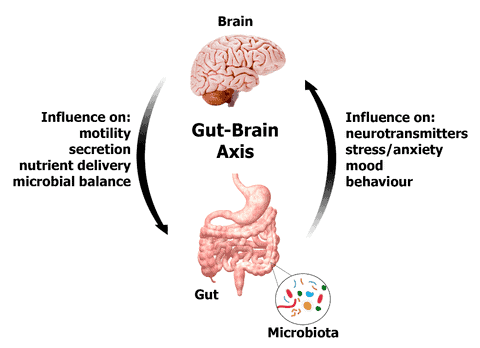
Since it’s in the same ballpark as Alzheimer’s, let’s next take a look at how gut bacterial affects mental health.
According to the American Psychological Association (APA), gut bacteria produce an array of neurochemicals that the brain uses for the regulation of physiological and mental processes, including memory, learning and mood. In fact, 95% of the body’s supply of serotonin is produced by gut bacteria, according to the APA. (8)
Serotonin is the chemical that helps with sleeping, eating, and digesting. It helps reduce depression, regulate anxiety, heal wounds and keep up bone health.
OK, 70% of immunity comes from gut bacteria and 95% of serotonin comes from gut bacteria. I think this is adding up to something.
It’s then unsurprising that gut bacteria have been associated with a number of mental health problems, including anxiety disorders and depression. In 2014, for example, a study lead by Dr. Kirsten Tillisch published in the journal Psychopharmacology found that prebiotics – carbohydrates that boost healthy bacteria in the gut – may be effective for reducing stress and anxiety. (9)
For the study, 45 healthy adults were randomized to receive the prebiotic or a placebo once a day for three weeks. All participants were then exposed to both negative and positive stimuli.
The team found that the participants who received the prebiotic were less likely to pay attention to the negative stimuli than those who received the placebo – suggesting lower anxiety in negative situations. They also had lower levels of the “stress hormone” cortisol.
“Time and time again, we hear from patients that they never felt depressed or anxious until they started experiencing problems with their gut,” said Dr. Tillisch, the study’s lead author. “Our study shows that the gut-brain connection is a two-way street.” (10)
The Right Gut Bacteria Benefits Cancer 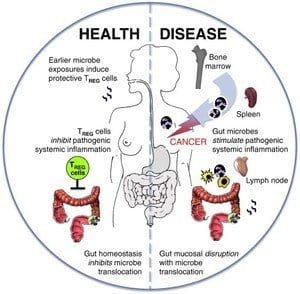
At this point there should be no surprise that scientists have investigated the link between gut bacteria and cancer. (11)
To wit:
- A 2013 study published in The Journal of Cancer Research discovered that a specific bacteria in the intestines – Lactobacillus johnsonii – may play a role in the development of lymphoma, a cancer of the white blood cells. (12)
- Another 2013 study conducted by UK researchers found that a common gut bacteria called Helicobacter pylori may cause stomach cancer and duodenal ulcers by deactivating a part of the immune system involved in regulating inflammation. (13)
- In 2014, researchers from the Icahn School of Medicine at Mount Sinai, New York, NY associated a specific combination of gut bacteria with the development of colorectal cancer. (13)
… and there’s more!
The link between gut bacteria and cancer is bi-directional. Meaning, certain gut bacteria can cause or stimulate cancer and other kinds may be important for improving the effectiveness of cancer treatment.
In 2013, a study by researchers from the National Cancer Institute found that immunotherapy and chemotherapy were less effective in mice lacking gut bacteria, with such treatments working much better in mice with a normal gut microbiome. (14)
Similar results were found in another 2013 study by French researchers. An anti-tumor drug, cyclophosphamide, was found to be much less effective in mice with limited gut bacteria, compared with mice with normal gut bacteria.
“Both studies are very exciting in that they show initial links between gut microbiota and [response to] therapies,” Harvard University’s Peter Turnbaugh told The Scientist. “The papers underscore the importance [of] microbes in shaping not just our initial predisposition to disease, but also our recovery from it.” (15)
The Right Gut Bacteria Benefits Obesity 
Obesity covers a lot of ground, given that it’s a common condition of several chronic diseases, such as heart disease, cancer and adult-onset (type 2) diabetes. (16)
(Dr. Mark Hyman popularized the term “diabestity” to reflect how connected they are, as I report in my article, The Diabetic Epidemic – It May Be Coming For You.)
There’s a clear association between the gut microbiome and weight gain; in fact, scientists who study the matter are finding evidence that bacteria in the gut may influence an individual’s susceptibility to obesity. For instance, obese people and thin people have different types of gut bacteria. (17)
One study looked at 77 pairs of twins characterized by one twin being obese and found that the overweight twin had different gut bacteria, and less of a diverse mix, than the thinner twin. (18)
Naturally lean people have more of a bacteria from the Bacteroidetes species, and less from the Firmicutes species. (19)
Researchers from Cornell University in Ithaca, NY, and King’s College London in the UK found that a certain strain of bacteria – Christensenellaceae minuta – was more common in people with a low body weight, and that the presence of this particular strain is highly influenced by genes. (19)
Moreover, at least in mice, introducing this bacteria to their guts caused the animals to gain less weight, indicating the bacteria may reduce or prevent obesity.
Study author Prof. Tim Spector of King’s College London said:
Our findings show that specific groups of microbes living in our gut could be protective against obesity – and that their abundance is influenced by our genes. The human microbiome represents an exciting new target for dietary changes and treatments aimed at combating obesity.
Test if Your Gut Bacteria Undermines or Supports Your Health
Now you know that you have a very important relationship with those microscopic entities that lurk in your gut and elsewhere in and on your body. That assertion is unquestionable. The thing to know is whether the relationship is a good one or not.
I keep saying the “right” gut bacteria benefits this and that, but what bacteria are the right ones?
If you consume a lot of plant-derived whole foods and fermented foods, and don’t eat sugary, processed foods, your buggies are probably serving you well. That said, you really don’t know till you put it to the test.
Next up is a test I want to cover that can show you what microbes — good and bad — make up your microbiome.
(Note: in an early version of this post, I covered the uBiome test which is no longer offered, as the company is out of business.)
Viome
Viome provides a detailed report that includes a list of all the bacteria in your gut and how your microbes compare to other’s. Unlike uBiome, they also make recommendations for supplements to take and foods to eat, which surprises me.
The reason I’m surprised is that Viome provides recommendations that I thought the FDA frowned upon, because the agency does not want such testing companies to diagnose health issues and prescribe interventions. This is what got the genetics company, 23andMe in hot water some years ago, although this restriction was recently eased a bit. (20, 21)
Here are three examples of parts of the test results provided by Viome:
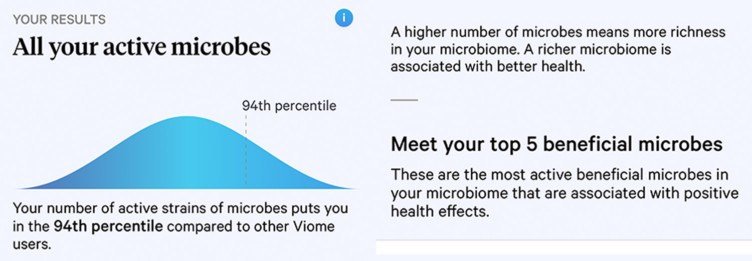
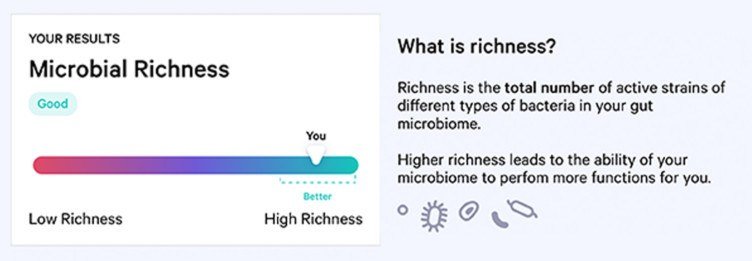
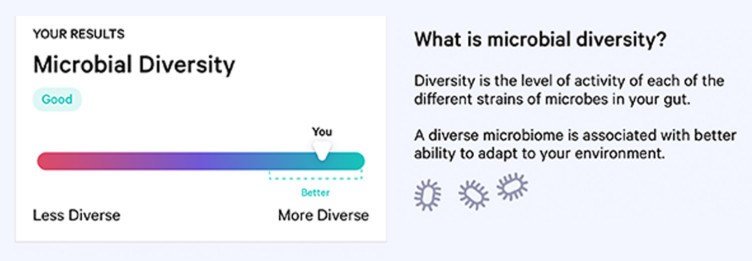
How To Get The Right Gut Bacteria Benefits
Generally speaking, diversity is good
Infants with less diverse gut bacteria at the age of three months were more likely to be sensitized to specific foods – including egg, milk and peanut – by the age of 1 year, indicating that lack of gut bacteria diversity in early life may be a driver for food allergies. (22)
Eat a lot of low-toxin, anti-inflammatory foods
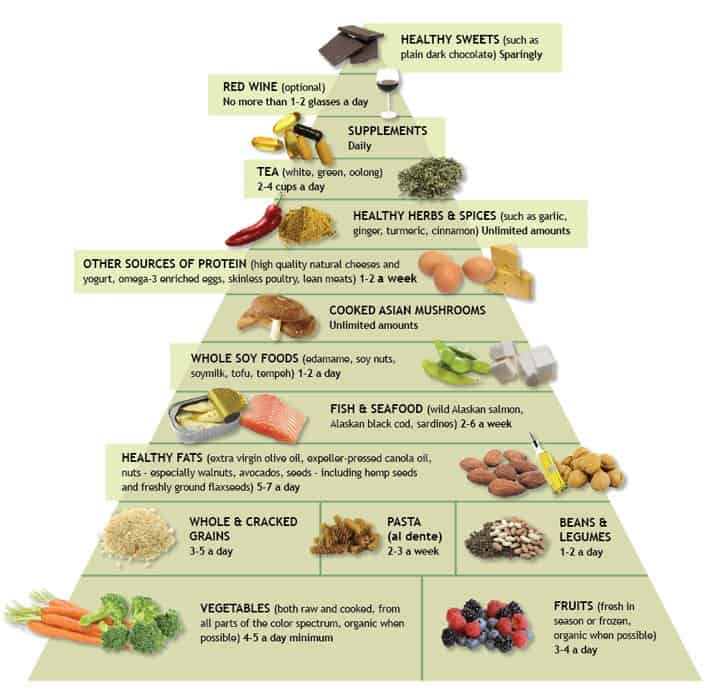
This is Dr. Andrew Weil’s Anti-Inflammatory Food Pyramid.
These include nutrient-dense vegetables and most anything that’s fermented (sauerkraut, kimchi, keifer). Consume “good” fats like avocado, salmon and walnuts, and high-quality protein (hemp, pea, salmon, lentils). These foods heal your gut and lower histamine intolerance. The key here is variety — this ensures that no one strain of bacteria dominates over the others.
According to the Mayo Clinic, a healthy diet can encourage the presence of good gut bacteria. They note that consuming fermented foods – such as miso and sauerkraut – increases the level of fermenting bacteria in the gut. In addition, fruits and vegetables contain fibers and sugars that can boost the health of gut bacteria.
Read Why Dr. Weil’s Anti-inflammatory Pyramid May Be The Best Diet.
Load up on polyphenols
Polyphenols — found in brightly colored vegetables, berries, coffee, and chocolate — can actually change the composition of your gut bacteria, increasing the amount of good bacteria and lowering the amount of bad bacteria. In one study, people who drank a wild blueberry drink for six weeks saw an increase in beneficial gut bacteria. (23)
Eat more resistant starch
Resistant starch is a type of starch that your body can’t digest — it passes through the stomach and small intestine and arrives in the colon intact. Here’s why resistant starch is so good for your gut — it acts like a prebiotic, and prebiotics are what your good gut bacteria eat. (24)
Get the right pre and probiotics
A prebiotic is a starch that feeds probiotics (think of it as nutrition for probiotics). Probiotics are the bacteria we’ve been talking about.
The time will come when you can tailor fit a probiotic strain to fit your health needs. A test like uBiome will show those strains for which you’re deficient. In the meantime, choose probiotic brands that offer high quality, diverse beneficial strains, such as these:
Take Metformin
Research with C. elegans has shown the effects of the microbiome on the aging process using the world’s most prescribed diabetes drug, metformin. (25)
Metformin is being tested in clinical trials as a potential treatment against aging and aging-related diseases. (26)
The interesting thing about metformin’s effects is that they delay aging through bacteria. Studies in C. elegans have shown that the longevity effects of metformin do not work in the absence of bacteria.
Specifically, metformin affects the folate bacterial metabolism, Ezcurra explained, which, in turn, triggers a chain reaction that ends with the activation of a molecular pathway known to regulate aging.
Read my post about the anti-aging benefits of Meformin.
Exercise
Exercise may also be key to improving gut bacteria diversity, according to a study published in the journal Gut, which compared the gut bacteria of 40 professional rugby players with that of two control groups. They found that the rugby players had higher levels of Akkermansiaceae in their gut – a bacterium that has been associated with reduced risk of obesity. (27)
In an editorial linked to the study, Dr. Georgina Hold, of the Institute of Medical Sciences at Aberdeen University in Scotland, noted that a better understanding of ways to improve health via gut bacteria is crucial:
As life expectancy continues to increase, it is important that we understand how best to maintain good health. Never has this been more relevant than in respect of our resident microbiota. Understanding the complex relationship among what we choose to eat, activity levels and gut microbiota richness is essential.
Developing new ways to manipulate the beneficial properties of our microbiota by finding ways to integrate health-promoting properties into modern living should be the goal.
Your Takeaway
Remember these four things:
- The right gut bacteria benefits your health in many ways, culminating in helping to prevent chronic disease and extending your healthspan, if not your lifespan.
- Beneficial bacteria are nurtured by eating omega 3 fatty acids, fermented foods, vegetables and resistant starch.
- It’s wise to supplement with high quality pre and probiotics. For probioitcs, look for total live organisms in the 30+ billion count.
- Don’t forget about exercise. It does far more than improve the population of beneficial bacteria. Read How To Maintain Lean Muscle As You Age and the last section of this post, called “The CR and Exercise Dynamic Duo”.
For more about your microbiome go here.
Last Updated on July 27, 2022 by Joe Garma


